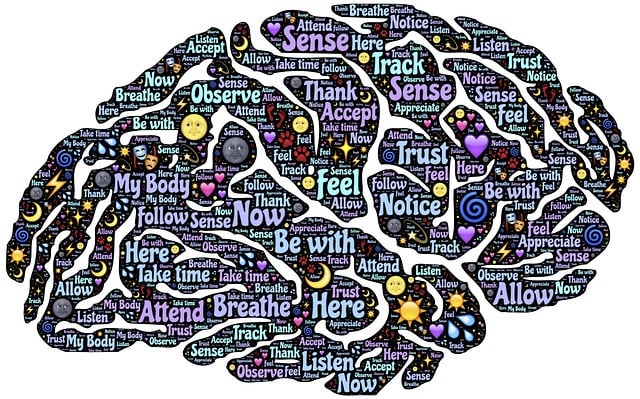Understanding Mental Health Data is vital for successful therapy, especially in complex conditions like Denver Functional Neurological Disorder Therapy (DFNDT). Standardized assessments, advanced techniques like neuroimaging, and machine learning enable comprehensive data collection and analysis. This data-driven approach personalizes treatment plans, improves care quality, and enhances communication strategies for DFNDT patients. Accurate interpretation of brain activity patterns reveals specific areas of dysregulation, guiding targeted interventions. Advanced data analytics transforms mental health treatments, leading to more personalized therapies, improved patient well-being, and informed public awareness campaigns for managing DFNDT symptoms.
Mental health data analysis plays a pivotal role in understanding and treating conditions like Denver Functional Neurological Disorder (DFND). This article explores key aspects of DFND therapy, beginning with data collection methods and assessment techniques. It delves into advanced data analysis strategies that reveal hidden patterns in neurological disorders. By interpreting these results, healthcare providers can refine treatment approaches, ultimately enhancing the effectiveness of DFND therapies in Denver.
- Understanding Mental Health Data: Collection and Assessment Methods
- Data Analysis Techniques for Uncovering Patterns in Neurological Disorders
- Interpreting Results: Implications for Denver Functional Neurological Disorder Therapy
- Enhancing Treatment Approaches through Advanced Data Interpretation
Understanding Mental Health Data: Collection and Assessment Methods

Understanding Mental Health Data is a multifaceted process that forms the backbone of effective therapy and treatment plans, especially for complex conditions such as Denver Functional Neurological Disorder Therapy (DFNDT). The first step involves meticulous data collection through standardized assessments and questionnaires designed to capture various aspects of mental health. These tools are crucial in assessing emotional regulation, mental wellness, and potential trauma, providing a comprehensive view of an individual’s psychological state.
Assessment methods have evolved to include advanced techniques that help professionals interpret complex data accurately. From structured clinical interviews to neuroimaging technologies, these approaches enable thorough evaluations, ensuring that interventions like DFNDT are tailored to each patient’s unique needs. Effective collection and assessment of mental health data form the foundation for evidence-based practices, ultimately enhancing the quality of care provided in trauma support services.
Data Analysis Techniques for Uncovering Patterns in Neurological Disorders

In the realm of mental health, data analysis plays a pivotal role in unraveling complex neurological disorders and enhancing patient care, especially in Denver Functional Neurological Disorder Therapy. Advanced techniques have emerged to mine vast datasets, enabling professionals to identify subtle patterns and trends that were once challenging to detect. By employing sophisticated algorithms and statistical methods, researchers can now gain deeper insights into the etiology and progression of various mental health conditions. This data-driven approach facilitates personalized treatment plans, improves outcomes, and ultimately contributes to the development of effective communication strategies for both patients and their support systems.
For instance, machine learning models can analyze large-scale datasets comprising medical records, genetic information, and behavioral observations to predict the onset or recurrence of neurological disorders. These models may uncover correlations between specific lifestyle factors, environmental exposures, and mental wellness. Furthermore, public awareness campaigns development often leverages data analysis to identify at-risk populations, design targeted interventions, and advocate for early detection and treatment. Such initiatives have the potential to revolutionize mental health support, ensuring that individuals with neurological disorders receive timely and effective care tailored to their unique needs.
Interpreting Results: Implications for Denver Functional Neurological Disorder Therapy

When analyzing data from Denver Functional Neurological Disorder Therapy sessions, interpreting results accurately is paramount to tailoring effective treatment plans. Each patient’s brain activity patterns and responses to therapy offer unique insights that can significantly influence their recovery journey. By closely examining these data points, therapists in Denver can identify specific areas of the brain showing abnormal connectivity or dysregulation, which are often linked to functional neurological disorders (FNDs).
For instance, impaired emotional regulation, a common trait among FND sufferers, might be reflected in altered activity within the limbic system. Conversely, burnout prevention strategies, such as Self-Awareness Exercises, could show promising results by demonstrating improvements in prefrontal cortex activation during stress management tasks. Understanding these implications can guide therapists in Denver to design targeted interventions, enhance treatment effectiveness, and ultimately improve patients’ overall well-being.
Enhancing Treatment Approaches through Advanced Data Interpretation

In the realm of mental health care, advanced data interpretation plays a pivotal role in enhancing treatment approaches for various disorders, including Denver Functional Neurological Disorder Therapy. By delving into complex datasets, healthcare professionals can uncover intricate patterns and insights that were previously obscured. This innovative approach allows for a more personalized and effective therapeutic strategy. Through sophisticated analytics, therapists gain access to valuable information about individual patient responses, enabling them to adapt their methods and target specific areas of improvement.
For instance, the analysis of large-scale patient records can reveal hidden correlations between neurological symptoms and underlying triggers, leading to the development of tailored interventions. Moreover, this data-driven perspective facilitates the creation of effective communication strategies within the therapy process. By understanding the nuances of patient experiences, therapists can implement public awareness campaigns that resonate with diverse populations, promoting stress management workshops and fostering a supportive community. Such initiatives ensure that treatment approaches are not only evidence-based but also accessible and impactful.
Mental health data analysis and interpretation play a pivotal role in advancing our understanding of neurological disorders, with significant implications for Denver Functional Neurological Disorder Therapy. By employing sophisticated data collection methods and advanced analytical techniques, we can uncover hidden patterns and insights that guide more effective treatment approaches. This article has explored these topics, highlighting the potential to revolutionize therapy strategies and improve patient outcomes. Through continued research and innovative analysis, mental health professionals can navigate the complexities of neurological disorders, ultimately fostering better care for those in need.














